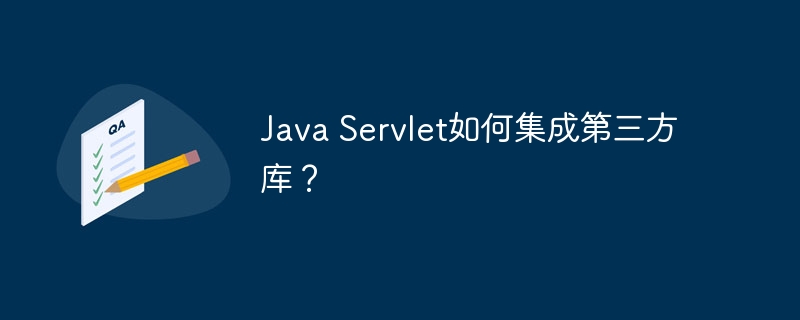
Integrating third-party libraries in Java Servlets requires the following steps: Add dependencies to the project, such as using Maven dependencies. Create a Servlet class and initialize the third-party library using the init() method. Use third-party library methods in the Servlet class to process requests and responses.

Java Servlet integrated third-party library
Servlet is a component often used in Java applications to handle HTTP requests and response. Sometimes, we need to integrate third-party libraries in Servlets to extend their functionality or simplify the development process. This article will introduce how to integrate third-party libraries in Java Servlets and provide a practical case.
Add Dependencies
First, we need to add the third-party library to our project. Dependencies can be managed using build tools such as Maven or Gradle. For example, for Maven dependencies:
org.example third-party-library 1.0
Creating a Servlet class
Next, let’s create a Servlet class to integrate the third-party library. In the Servlet class, we can use theinit()method to initialize the third-party library:
public class MyServlet extends HttpServlet { @Override public void init() { // 初始化第三方库 try { // 加载第三方库的类 Class.forName("org.example.ThirdPartyLib"); } catch (ClassNotFoundException e) { e.printStackTrace(); } } // ... }
Practical case
Now, let us pass A practical case to demonstrate how to integrate third-party libraries. We use the Apache Commons Text library as an example, which provides some useful string processing utilities:
org.apache.commons commons-text 1.9
Now, we can use the classes of the Commons Text library in a Servlet:
import org.apache.commons.text.WordUtils; public class MyServlet extends HttpServlet { @Override public void init() { // 初始化第三方库 try { Class.forName("org.example.ThirdPartyLib"); } catch (ClassNotFoundException e) { e.printStackTrace(); } } @Override protected void doGet(HttpServletRequest request, HttpServletResponse response) { String input = request.getParameter("input"); String output = WordUtils.capitalizeFully(input); response.getWriter().write(output); } }
In In this example, we use theWordUtils.capitalizeFully()method to capitalize each word in the string, and then respond to the client with the processed string.
The above is the detailed content of How does Java Servlet integrate third-party libraries?. For more information, please follow other related articles on the PHP Chinese website!
